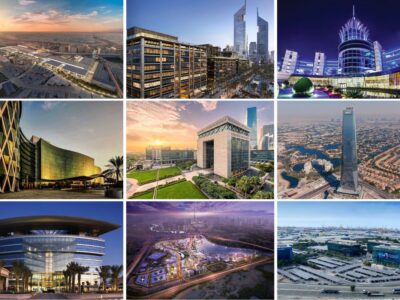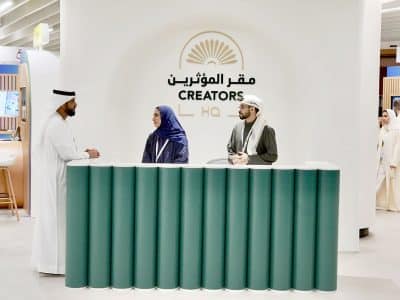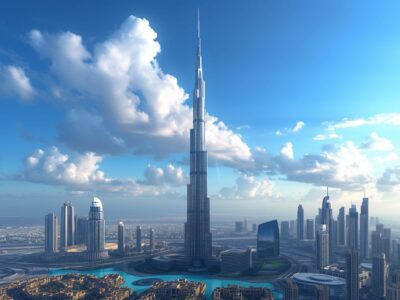Have you ever wondered what it feels like to pitch your start-up idea to a crowd of entrepreneurs and innovators not much different to yourself?
“We had a lot more fun when compared to pitching to an investor, which is more serious and goes into the details like what’s the market analysis, competitors, and similar,” says Mark James, co-founder of WEPUL, which won an AED10,300 crowd-funded prize at Impact Hub Dubai’s first Live Crowdfunding Contest.
“We were just talking about why we built it [WEPUL] in the first place – it was all about sharing the heart that is behind it as opposed to the numbers.”
Brit expat James and his co-founder Sebastian Ritter, pitched their global web-based platform for trading time and money for skills against nine other start-up ideas.
The event was held at Impact Hub Dubai’s premises in Souq Al Bahar, Downtown Dubai, which was packed with more than 100 budding start-ups, venture capitalists and the hub’s management team – Aman Merchant, Habib Al Assad and Hebah Fisher.
In addition to voting for one of the innovative and creative start-up ideas, we spoke to Al Assad, founding co-director of the hub, about its inception, mission and future plans.
“A big challenge for people with ideas for a start-up is to obtain funding and get into the right sort of network to secure finance to start the venture,” he says.
“In addition, you have many non-profits, initiatives or individuals, who are starting up a venture that may not necessarily have an extremely profitable business model from an investment point of view.However, it is extremely wanted by the society.
“So for both these types of innovators it has been very challenging, and add to that the local lack of openness in terms of lending by the banking sector. It creates many barriers.
“Crowdfunding is a solution to that because now the funding can come from the crowd itself – it can come from the potential users of the solution, adopters, fans, including friends and family, who want to see you succeed with your venture.”
Crowdfunding allows the power of people to finance projects by generating small contributions from large numbers of people.
According to a study by the World Bank, entitled Crowdfunding’s Potential for the Developing World, the global crowdfunding market, which was estimated to be worth of $5.4bn in 2013, is set to hit $93bn by 2025.
However, Al Assad highlights that the hub hasn’t been created because they aim for an exit in terms of financial profit, but because they want to increase the pull in terms of innovations and innovators in Dubai.
Article continued on next page…
“Primary focus is learning,” he says. “First and foremost we are a place of learning because innovation cannot be taught in the classroom.
“It’s something that is developed through experimentation, action, learning by doing – so we facilitate the platform for that learning by providing and enabling the community for that to happen.
“We are doing something that is good for the wider economy.”
A quartet of Dubai entrepreneurs started the hub as a non-profit organisation in 2009, moving to Souq Al Bahar at the beginning of 2014.
Since then they have attracted 50 hubsters and are looking at “60 more towards the end of this summer,” according to Al Assad.
But how do you actually define a hubster? A hubster is a person with a good idea for the world who attends any of the 54 hubs around the world to be creative, work and meet with other like-minded people.
All of which is part of the vision of the concept’s creator, Johnathan Robinson, who opened the first hub in London in 2005.
The UWC Atlantic College alumnus and Edinburgh University anthropology graduate felt that there was a lack of awareness of and support for career paths different from corporate ones. Especially for those who wanted their work to tackle pressing world problems.
In line with this spirit, Al Assad presents the criteria for becoming a hubster in Dubai: “We purposely like not to set very high criteria because we believe in the spirit of inclusion.
“We’d like to provide an opportunity for everyone in Dubai to be part of what we are doing.
“We are very inclusive, but we are not open to the public. So we look at people who are like-minded, and will personally fit in terms of their values, the project they are working on and their contribution to our eco-system – to learn and share learning.”
When asked to describe a typical Dubai hubster, he points out: “In Dubai, we are benefiting from being in a city with an incredible amount of diversity. Our hub in Dubai reflects that – it’s a microcosms of the demographics of the society out there.”
There’s a huge diversity of ideas and ventures in Impact Hub Dubai, spanning from ethical fashion, and alternative energy to technology, trade, and the legal field.
Al Assad explains that some of them work on these innovations through the private sector, but they also host government and corporate employees who are innovating internal projects for employers.
Article continued on next page…
“We also have different levels of experiences – from university students to employees and aspiring entrepreneurs as well as career changers.
“They are doing that out of our lab because it’s a place of inspiration where they are surrounded by what the future looks like, and so they can remain continuously relevant.”
In his opinion the world of start-ups is changing and there is a lot of pressure on start-ups to “fly so fast that they fly apart, and that’s not really sustainable.”
He adds: “What we offer is another possibility – to take some time and slow down, nurture the connections and support in order to be on solid footing as you progress and as you scale.”
One of the hubsters, who was also pitching her idea at the event, is Aya Fisher, co-founder of YallaFit, a comprehensive online platform to provide convenient fitness and education on healthy living to all.
She has been part of Dubai’s hub from the very beginning.
“I’m a freelance consultant, and I always look for a place to work from instead of doing it from home,” she says.
“It helped me get a feel of the market and get the word out there.”
Continuing about the criteria for joining and rules new hubsters need to adhere to, Al Assad says: “We have a few hub’s rules – like mutual respect of each other’s time – but other than that it’s a very free community and it’s not a very structured programme since we provide a lot of freedom for self-learning.”
In order to keep the concept going, all hubsters pay an affordable monthly fee which is determined on the basis of the chosen membership package, depending on the number of hours one uses the space.
In addition to being “crowd-powered” through these monthly fees, the hub is also financed by renting its premises to corporate clients as well as through the support of a few organisational benefactors who believe in their cause and support particular initiatives.
However, Al Assad points to a difference from traditional 1990s incubators: “We do not take any equity, any investment share in their [hubsters’] projects.
“However, these connections and funding are happening within our community. Crowdfunding is one, but we also have a resident venture capitalist firm, Emerge Ventures, for more institutional funding.
“So we do provide access to funding sources. However, we ourselves do not expect any return.”
Article continued on next page…
Although it’s been only four months since launch, Impact Hub Dubai can already take pride in one of its entrepreneurial success stories – Jointly.
This start-up was founded by Samia Kallidis to connect volunteers, who are willing to help in the case of humanitarian crises, with organisations that manage the response to these crises.
Al Assad says: “The challenge is that when these crises happen the organisations need to react very quickly and mobilise the volunteers who are closest to where the disaster has happened.
“So Samia’s idea was to create an iPhone app to locate the closest volunteers and mobilise them towards that need.
“During her time at Impact Hub Dubai she conducted a show-and-tell of her idea with other hubsters, which attracted people who were experts in technology and application development.
“Through this community, she also got connected with those who were working in humanitarian solutions around the world, for example in Switzerland through Impact Hub Zurich.”
Another start-up with a social cause at its core is Dumyé, a doll company that employs women in emerging markets to produce tailored dolls that are then donated to orphans.
Its founder, Sahar Wahbeh, a graphic designer who has been living in Dubai for the last eight years, decided to participate in the pitching event after attending one of the hub’s other events.
She says: “A friend invited me for a TedNight when they were discussing a topic relevant to Dumyé, and that’s how I found about it. It’s always nice to share your story and let people hear about what you are doing.”
Wahbeh took part in the event aiming to raise funds to set up proper production with an NGO in India.
In addition to the already established cooperation with START, a non-profit organisation founded by Art Dubai and the Al Madad Foundation, and Dubai’s Social Care Centre, Dumyé will hold its first art therapy workshop for orphans at the Maria Art Center in Sharjah very soon.
“We pledge to give a doll to an orphan. Once we get enough funding, we hold a workshop at an orphanage and children choose their own doll,” she says.
With many more examples of how their hubsters make real social impacts, Al Assad admits that measuring innovation requires special metrics.
Article continued on next page…
“It’s still a little bit of a stretch in terms of accuracy of how you measure innovation which is a very abstract concept,” he says.
“We look at it through two measures. The first one is the number of impact stories that come out of our community. So we look at how they’ve contributed to sustainability.
“We also look at some innovative measures – for example, the number of creative collisions that happen within our lab space which is architected to facilitate and promote greater collaboration between individuals.”
An idea’s impact potential was also a criterion for the selection process of nine out of 50 start-up applications received for this first live crowdfunding contest.
“We looked at the uniqueness of the idea, its novelty, team composition, passion, potential for impact it can have and all the potential outcomes,” Al Assad explains.
In addition to WEPUL’s first prize, Impact Hub Dubai awarded three runners-up prizes to Dumyé, Ustad Mobile (Mobile Teacher), and Unveil Arabia, confirming Al Assad’s words: “In the spirit of community-oriented initiatives, everyone is a winner.
“So we support the spirit of sharing the rewards out of the crowd-funded activities like this,” he says.
The prize awarded to WEPUL was paid by the attendees as entrance fees, but they will also be granted a hubstership, which includes access to the hub’s lab facility and an opportunity to engage in learning since Al Assad explains that “learning will come very much through peer mentorship.”
“There are other hubsters in the lab who are working on the similar ideas with varying levels of experience and within different industries. They will also provide certain type of support.
“Support will also come through a creative collisions that might happen through the access to the global network of 8,000 other innovators from 54 Impact Hubs around the world,” he adds.
When asked about what the future holds for those start-ups that dare to create it, he explains that their Impact Hub Passport, which includes one free co-working day at any Impact Hub around the world, allows all hubsters to scale and globalise much faster.
And a big opportunity it is having in mind that this global campus, incubator and innovation lab concept aims to grow to nearly 100 hubs and 25,000 members by 2015.








